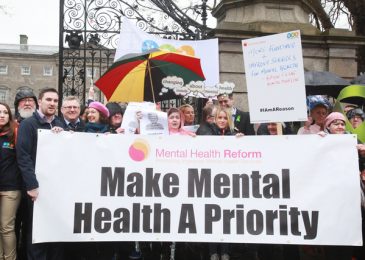Taking to the streets to fix our mental health system
Kendall Worth is a poverty and mental health activist and welfare recipient. He is the co-chair of the Benefits Reform Action Group. This is a follow-up on an earlier opinion piece published in the Nova Scotia Advocate, also by Kendall.
KJIPUKTUK (Halifax) – Even though the Bell Let’s Talk campaign is doing good work, advocating to end mental health stigma needs to go further. What is missing from that campaign is that people need to think about the need for government to invest money into ending mental health stigma.
So what is mental health stigma?
In a lot of mental health cases this is down right difficult to figure out. Overall it is the negative attitudes against mental health of our general population that cause stigma. If there was a better understanding of mental health in our society then there would be no stigma. At least that is the way mental health consumers who I personally talk to feel about it.
And how do we get rid of that stigma?
We need to start off by reducing stigma before attempting to end it. With a method of reducing stigma in place, ending stigma will happen as time goes on.
What needs to be considered as a start-off point to do this work is improving the mental health system in general. When I talk to people about mental health, they volunteer to tell me as part of their conversations that they find they do not get much from using the mental health system we have here in Nova Scotia.
What about poverty?
Also important to consider is that most mental health consumers live in poverty.
I learned from talking to people who attend the Canadian Mental health Association’s Sharing and Caring Social Club located at 2020 Gottingen Street that not all mental health consumers live in poverty. However, there are only a few cases where the mental health consumer does not live in poverty.
One way to start getting rid of stigma is to put together a mental health research team. I propose the work of this team would be to do research on why different people out there are living with mental health issues and mental illness. Interview people with mental illness is what I suggest.
Creating a community of peer support
Ultimately we must create a community of peer support for people with mental illness.
It is all about community coming together. Locally here in Halifax, there are several examples of that.
One of these examples is the Caring and Sharing Social Club located at 2020 Gottingen I mentioned before. This club serves as a drop-in for registered members. In order to be a registered member you have to be a mental health consumer. I get the privilege of visiting there once in awhile because I am a registered member. However on Saturdays from fall to spring yearly, they have a coffee house which is open to the general public.
Other examples are the different peer support groups around HRM. These groups are organized through agencies called the Self Help Connection, and the Healthy Minds Cooperative.
Anyway, there have been times when I have tried to talk to the members of these clubs about organizing a protest to end mental health stigma. Also I have talked others I know in the wider community about organizing a protest as well.
Hey Ho, Mental Health Stigma Has Got To Go!
Mental health consumers, at least the ones I talk to anyway, do not understand what they would be protesting. This is why you do not see a protest outside of Province House with people chanting “hey ho ho, mental health stigma has go to go!”
Well, here is what the protest would need to be about.
#1 – For the government to invest more money in fixing the systemic problems of the mental health system. I have read many mainstream media stories about mental health consumers committing suicide because they had to wait too long for referrals to mental health professionals through the system.
#2 – For the general public as well as government to change their negative attitudes towards mental health.
A better mental health system is needed. More programs in the community are needed.
Help us publish more important stories like this one. Donations are only used to pay people like Kendall who write for the Nova Scotia Advocate.





